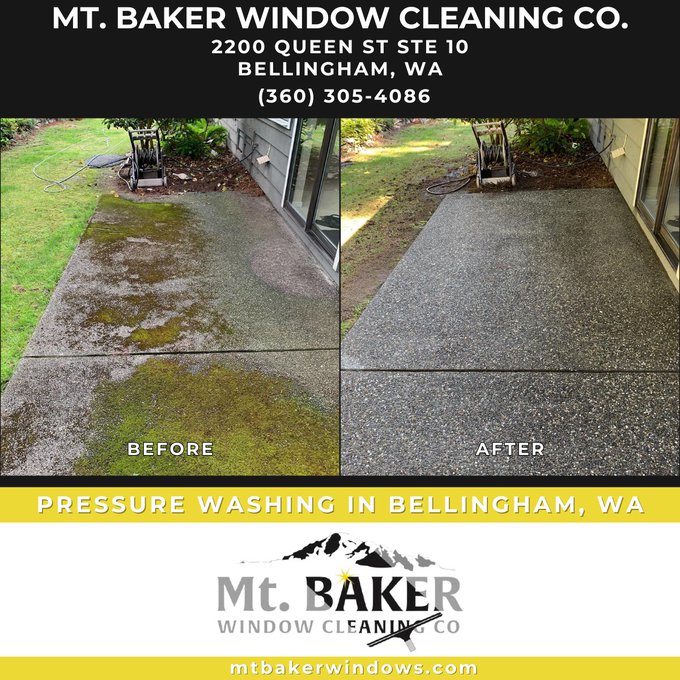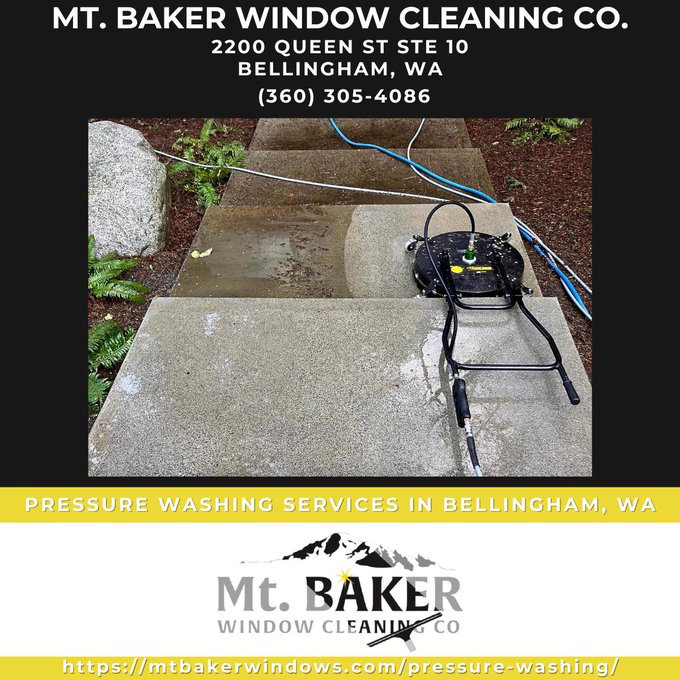Operating high-pressure equipment, like pressure washers or power washers, can be a daunting task, especially if you're not Mt. Baker Window Cleaning Co. address aware of the safety protocols involved. Whether you’re a seasoned pro or just starting in this field, understanding the best practices for safety when operating high-pressure equipment is crucial. In this article, we’ll delve deep into various aspects of safe operation, maintenance tips, and frequently asked questions related to pressure washing.
Understanding High-Pressure Equipment
What is High-Pressure Equipment?
High-pressure equipment refers to tools that use pressurized water to clean surfaces effectively. This includes pressure washers and power washers, which are commonly used commercial pressure washing Mt. Baker Window Cleaning Co. for cleaning driveways, houses, decks, and more.
Types of High-Pressure Equipment
Electric Pressure Washers: These are lighter and ideal for smaller jobs. Gas Pressure Washers: More powerful and suitable for larger tasks. Hot Water Pressure Washers: Ideal for tough stains that require heat.Applications of High-Pressure Equipment
High-pressure equipment is utilized in various sectors, including residential cleaning, commercial services, and industrial applications. They can remove grime from buildings, wash vehicles, and even prepare surfaces for painting.
Best Practices For Safety When Operating High-Pressure Equipment
Personal Protective Equipment (PPE)
Before operating any high-pressure equipment, it’s essential to wear appropriate PPE:
- Safety Goggles: Protects your eyes from flying debris. Gloves: Ensures grip and protects against chemicals. Boots: Non-slip footwear prevents accidents on wet surfaces.
Inspecting Your Equipment
Regular maintenance checks can prevent accidents:
- Check hoses and connections for leaks. Ensure nozzles are functioning properly.
Understanding Pressure Ratings
Knowing the right PSI (pounds per square inch) is vital:
- A general house wash may require 1300 to 2000 PSI.
Proper Handling Techniques
Always hold the gun with both hands and maintain a firm grip. Point the nozzle away from people and pets at all times.
Common Mistakes to Avoid
Ignoring Manufacturer’s Instructions
Each piece of high-pressure equipment comes with specific guidelines. Ignoring these instructions can lead to misuse and potential danger.
Overusing Chemicals
While detergents can enhance cleaning power, using too much can damage surfaces or create harmful reactions.
Understanding Costs Associated with Pressure Washing
How Much Should a Pressure Washer Charge?
The cost varies based on several factors including location, job size, and type of surface being cleaned.
| Service Type | Average Cost | |--------------------------|----------------------| | Residential Cleaning | $0.15 - $0.30 per sq ft | | Commercial Cleaning | $0.10 - $0.25 per sq ft | | Deck Staining | $1 - $2 per sq ft |
" width="560" height="315" frameborder="0" allowfullscreen>
What’s the Difference Between a Power Wash and a Pressure Wash?
The primary difference lies in temperature; power washing uses heated water while pressure washing uses cold water.
Scheduling Your Pressure Washing Jobs
How Often Should I Pressure Wash My House?
Generally speaking:
- Every 1–2 years for exterior surfaces.
How Long Does It Take to Pressure Wash a 2000 Sq Ft House?
Typically around 2–4 hours depending on surface condition.
Technical Aspects of Pressure Washing
What Is Soft Washing a House?
Soft washing involves using low pressure combined with specialized solutions to clean delicate surfaces without causing damage.
Calculating Costs for Different Services
To calculate costs effectively:
Measure the area. Determine necessary treatments needed (soft wash vs pressure wash).| Service | Estimated Time | Average Cost | |--------------------------|---------------------|----------------------| | Driveway | 60–90 minutes | $100 - $200 | | Deck | 30–60 minutes | $150 - $300 |
Operational Challenges in Pressure Washing
Why Does Pressure Washing Take So Long?
Factors like surface type, weather conditions, or improper techniques can extend job duration.
How Many Square Feet Can You Pressure Wash in an Hour?
On average:
- With an efficient machine: about 500–800 sq ft/hour.
FAQs About High-Pressure Equipment Safety
Q1: Should I pressure wash my own house?
A: If you have experience with high-pressure equipment and proper safety measures in place, it's feasible. Otherwise, consider hiring professionals.
Q2: How do you charge customers for pressure washing?
A: Charges typically depend on area size and service type; standard rates range from $0.10-$0.50 per sq ft based on complexity.
Q3: What PSI is needed to pressure wash a house?
A: Generally between 1300–2000 PSI is adequate for home exteriors without causing damage.
Q4: How long does it take for a house to dry after power washing?
" width="560" height="315" frameborder="0" allowfullscreen>
A: Depending on weather conditions—usually between 2 to 24 hours.
Q5: Is pressure washing good money?
A: Yes! When done correctly, it has potential for significant profit margins due to low overhead costs.
Q6: How do you quote someone for pressure washing?
A: Assess the job site size & specific needs before providing an estimate based on established pricing models mentioned earlier.
Conclusion
In conclusion, understanding best practices for safety when operating high-pressure equipment is paramount not only for personal safety but also for achieving effective cleaning results without damaging surfaces or injuring yourself or others nearby. Whether you're running a professional service or simply maintaining your property’s aesthetic appeal through regular cleaning jobs like deck staining or driveway washing—always prioritize safety protocols alongside technical knowledge about your tools!
Remember that consistent practice leads to mastery over time as well as increased awareness about potential hazards associated with high-pressure operations!

